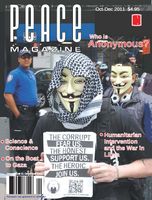
Peace Magazine Oct-Dec 2011, page 6. Some rights reserved.
Search for other articles by Monia Mazigh here
Researcher and author Monia Mazigh is best known for her tenacious—and ultimately successful—efforts to free her husband Maher Arar from detention in Syria. In May, she spoke to a Science for Peace forum on the North African and Middle East uprisings. Here are her observations about Canada’s role in the five Arab countries most affected by the 2011 wave of revolts and protests.
When the uprising started in Tunisia, the Canadian government was very timid, almost inaudible. There was not even a travel advisory. Immediately, after Ben Ali fled to Saudi Arabia, one of his brothers-in-law arrived in Quebec in a private jet. The Canadian government reaction was slow and hesitant. France and Switzerland and other European countries were quick to freeze the assets of the Tunisian dictator and his family and friends. Harper declared that the brother-in-law of Ben Ali wasn’t welcome but still he was allowed to stay. Opposition MPs demanded that the government freeze the assets of the Tunisian dictator and his accomplices. It took the Canadian government more than two months to introduce new legislation to make sure it has the power to freeze the assets of foreign heads of state.
The Canadian government was under pressure because it ordered an asset freeze for the Libyan dictator but not for the Tunisian dictator. Canada said that it was able to stop Libyan dictator Muammar Qadhafi and his close associates from accessing their assets in Canada because of a May 2011 UN resolution which it had supported. Clearly, for the Canadian government, Tunisia didn’t have the same importance as Libya. The Libyan oil fields weigh so much more heavily.
The official Canadian response, aside from warning against travel to the country, called for both the Egyptian security forces and protesters to refrain from violence and for the government of President Hosni Mubarak to unblock Internet sites like Twitter that were used for organizing rallies. Sometimes during the Egyptian revolution, we had the impression that the Canadian government sided with the dictator, not the people. In the US, the situation was different. After hesitating, the Obama administration finally broke with its old military ally, and in effect advised Hosni Mubarak to step down in favor of a transition to constitutional democracy. Yet even Harper, who was one day with President Obama at a joint news conference in Washington, refused to endorse Obama’s call for change. Indeed, by the last few days of the old regime, Canada was the only Western country left supporting Mubarak.
Since the beginning, Canada condemned the Libyan regime’s brutal attacks and called on it to immediately cease the use of force against its own citizens. The unanimous passing of United Nations Security Council Resolutions 1970 and 1973 sends a clear message: the murder of its own citizens by the Libyan regime and the gross violations of the population’s human rights will not be tolerated by the international community, and will carry serious consequences. The council authorized:
This “aggressive” reaction contrasts with the lethargic reactions of the Canadian government vis-à-vis the other countries. Here the economic interests with Libya are clearly important.
The Canadian reaction to protests in Bahrain was timid. A travel advisory was issued by the Department of Foreign Affairs. Later, Canada issued a statement urging the Bahraini government to respect its citizens and their rights. “Canada urges the Government of Bahrain to protect the safety of demonstrators and return to fully respect their freedom of assembly.
“We urge the authorities to promptly restore an environment favorable to open dialogue among all Bahraini stakeholders. Canada condemns reported human rights abuses against the Bahraini population and violations of international humanitarian law.”
It seems that the lukewarm US reaction to the situation in Bahrain influenced the Canadian government. We shouldn’t forget that Saudi Arabia is the closest ally of the US in the region and any change to the geo-political order of the neighboring countries means trouble for the US and its partners.
While the United States and the European Union have already taken action against Syria, the Canadian government didn’t take any concrete action until the end of May 2011. John Baird, the Canadian foreign affairs minister, said that Canada’s decision was delayed by the campaign for the May 2 election. Ottawa will bar senior members of the Syrian government from Canada as part of sanctions to punish the country for an “abhorrent” crackdown on civilian protests. The new measures, including a ban on arms exports to Syrian security forces, were adopted in May by the new cabinet committee on national security chaired by the prime minister.
It is obvious from all the examples above that Canada isn’t holding to its principles of an honest peace broker. Indeed, Canada participated in the NATO mission against Libya without thinking about the tragic consequences of the killing of civilians. Meanwhile, civilians continue to die daily in Yemen and Syria at the hands of the security agents and police, but Canada turns a blind eye to these countries as if some countries need democracy and others do not. Canada should be promoting peace, justice and democracy in all the countries of the Middle East without preference. We can’t be on the other side of history.
Monia Mazigh is an author and human rights activist.

Peace Magazine Oct-Dec 2011, page 6. Some rights reserved.
Search for other articles by Monia Mazigh here